Related Research Articles

In Greco-Roman mythology, Aeneas was a Trojan hero, the son of the Trojan prince Anchises and the Greek goddess Aphrodite. His father was a first cousin of King Priam of Troy, making Aeneas a second cousin to Priam's children. He is a minor character in Greek mythology and is mentioned in Homer's Iliad. Aeneas receives full treatment in Roman mythology, most extensively in Virgil's Aeneid, where he is cast as an ancestor of Romulus and Remus. He became the first true hero of Rome. Snorri Sturluson identifies him with the Norse god Víðarr of the Æsir.

Publius Vergilius Maro, usually called Virgil or Vergil in English, was an ancient Roman poet of the Augustan period. He composed three of the most famous poems in Latin literature: the Eclogues, the Georgics, and the epic Aeneid. A number of minor poems, collected in the Appendix Vergiliana, were attributed to him in ancient times, but modern scholars consider his authorship of these poems to be dubious.
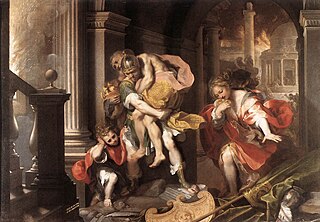
The Aeneid is a Latin epic poem that tells the legendary story of Aeneas, a Trojan who fled the fall of Troy and travelled to Italy, where he became the ancestor of the Romans. Written by the Roman poet Virgil between 29 and 19 BC, the Aeneid comprises 9,896 lines in dactylic hexameter. The first six of the poem's twelve books tell the story of Aeneas' wanderings from Troy to Italy, and the poem's second half tells of the Trojans' ultimately victorious war upon the Latins, under whose name Aeneas and his Trojan followers are destined to be subsumed.

John Crowe Ransom was an American educator, scholar, literary critic, poet, essayist and editor. He is considered to be a founder of the New Criticism school of literary criticism. As a faculty member at Kenyon College, he was the first editor of the widely regarded Kenyon Review. Highly respected as a teacher and mentor to a generation of accomplished students, he also was a prize-winning poet and essayist. He was nominated for the 1973 Nobel Prize in Literature.
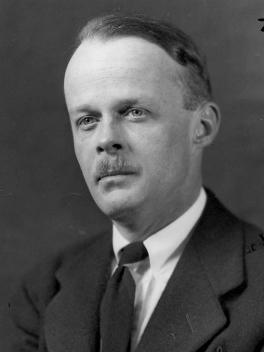
John Orley Allen Tate, known professionally as Allen Tate, was an American poet, essayist, social commentator, and poet laureate from 1943 to 1944. Among his best known works are the poems "Ode to the Confederate Dead" (1928) and "The Mediterranean" (1933), and his only novel The Fathers (1938). He is associated with New Criticism, the Fugitives and the Southern Agrarians.
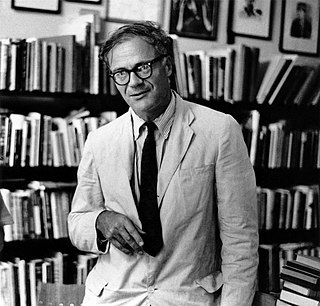
Robert Traill Spence Lowell IV was an American poet. He was born into a Boston Brahmin family that could trace its origins back to the Mayflower. His family, past and present, were important subjects in his poetry. Growing up in Boston also informed his poems, which were frequently set in Boston and the New England region. The literary scholar Paula Hayes believes that Lowell mythologized New England, particularly in his early work.

Cleanth Brooks was an American literary critic and professor. He is best known for his contributions to New Criticism in the mid-20th century and for revolutionizing the teaching of poetry in American higher education. His best-known works, The Well Wrought Urn: Studies in the Structure of Poetry (1947) and Modern Poetry and the Tradition (1939), argue for the centrality of ambiguity and paradox as a way of understanding poetry. With his writing, Brooks helped to formulate formalist criticism, emphasizing "the interior life of a poem" and codifying the principles of close reading.

The Kenyon Review is a literary magazine based in Gambier, Ohio, US, home of Kenyon College. The Review was founded in 1939 by John Crowe Ransom, critic and professor of English at Kenyon College, who served as its editor until 1959. The Review has published early works by generations of important writers, including Robert Penn Warren, Ford Madox Ford, Robert Lowell, Delmore Schwartz, Flannery O'Connor, Boris Pasternak, Bertolt Brecht, Peter Taylor, Dylan Thomas, Anthony Hecht, Maya Angelou, Rita Dove, Derek Walcott, Thomas Pynchon, Don Delillo, Woody Allen, Louise Erdrich, William Empson, Linda Gregg, Mark Van Doren, Kenneth Burke, and Ha Jin.
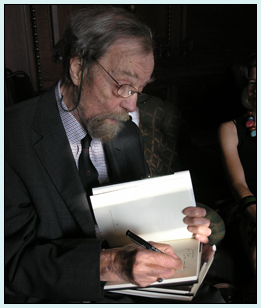
Donald Andrew Hall Jr. was an American poet, writer, editor, and literary critic. He was the author of over 50 books across several genres from children's literature, biography, memoir, essays, and including 22 volumes of verse. Hall was a graduate of Phillips Exeter Academy, Harvard University, and Christ Church, Oxford. Early in his career, he became the first poetry editor of The Paris Review (1953–1961), the quarterly literary journal, and was noted for interviewing poets and other authors on their craft.

The Georgics is a poem by Latin poet Virgil, likely published in 29 BCE. As the name suggests the subject of the poem is agriculture; but far from being an example of peaceful rural poetry, it is a work characterized by tensions in both theme and purpose.
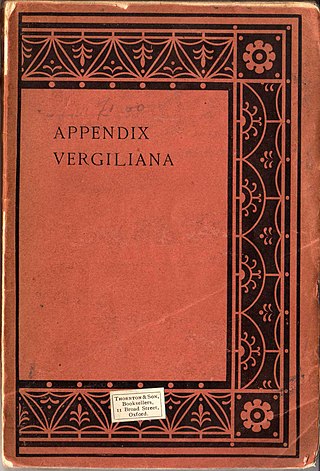
The Appendix Vergiliana is a collection of Latin poems traditionally ascribed as being the juvenilia of Virgil.
Gyas, a character in Virgil's Aeneid, features most extensively as one of the captains in the boat race in Book 5. He also appears (briefly) in Books 1 and 12. He was claimed as the eponymous ancestor of the Gegania gens, a patrician family of the Roman Republic.

The shield of Achilles is the shield that Achilles uses in his fight with Hector, famously described in a passage in Book 18, lines 478–608 of Homer's Iliad. The intricately detailed imagery on the shield has inspired many different interpretations of its significance.

Eleanor Ross Taylor was an American poet who published six collections of verse from 1960 to 2009. Her work received little recognition until 1998, but thereafter received several major poetry prizes. Describing her most recent poetry collection, Kevin Prufer writes, "I cannot imagine the serious reader — poet or not — who could leave Captive Voices unmoved by the work of this supremely gifted poet who skips so nimbly around our sadnesses and fears, never directly addressing them, suggesting, instead, their complex resistance to summary."
David Russell Ferry was an American poet, translator, and educator. He published eight collections of his poetry and a volume of literary criticism. He won the National Book Award for Poetry for his 2012 collection Bewilderment: New Poems and Translations.

In classical studies the term epyllion refers to a comparatively short narrative poem that shows formal affinities with epic, but betrays a preoccupation with themes and poetic techniques that are not generally or, at least, primarily characteristic of epic proper.
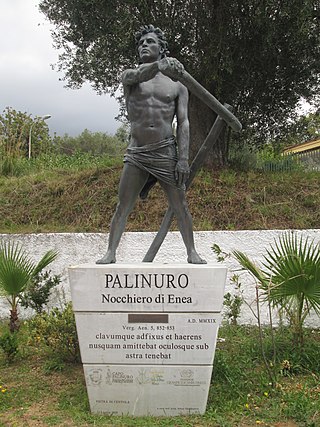
Palinurus (Palinūrus), in Roman mythology and especially Virgil's Aeneid, is the coxswain of Aeneas' ship. Later authors used him as a general type of navigator or guide. Palinurus is an example of human sacrifice; his life is the price for the Trojans landing in Italy.

Richard Oliver Allen Marcus Lyne, also known as R.O.A.M. Lyne, was a British academic and classicist specialising in Latin poetry. He was a tutor in classics at Balliol College and Professor of Classical Languages and Literature at the University of Oxford.
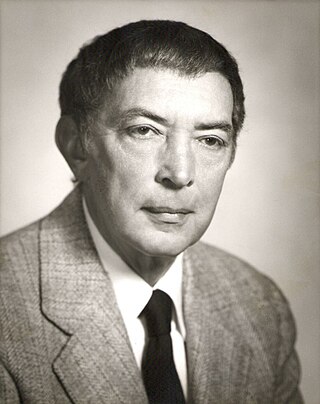
Radcliffe Squires was an American poet, writer, critic, and academic. He published several well-regarded books of poetry, as well as biographical and critical works which focused on highly acclaimed 20th-century writers.
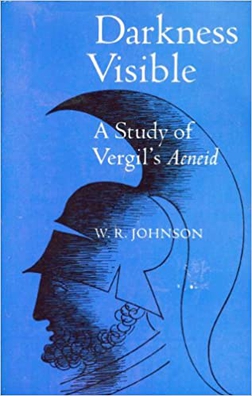
Darkness Visible: A Study of Vergil's Aeneid is an academic monograph by the American Latinist W. R. Johnson. Published in 1976 by University of California Press, the book presents an interpretation of the Aeneid, an epic by the Roman poet Vergil. Claiming to abandon previously dominant historical-political reading, Johnson argues that the poem is at its heart concerned with the darkness of the human condition.
References
- 1 2 Kirchwey, Karl (2014). "Vergil's Aeneid and Contemporary Poetry". A Companion to Vergil's Aeneid and its Tradition. Wiley Blackwell. p. 471. ISBN 9781118785126.
- ↑ Koch, Vivienne (1949). "The Poetry of Allen Tate". The Kenyon Review . 11 (3): 355–378. JSTOR 4333057.
- ↑ Dupree, Robert (October 1, 1972). "The Mirrors of Analogy: Three Poems by Allen Tate" . The Southern Review . 8 (4): 774. Retrieved May 2, 2024.